Every year for some time now, my friend Daisy and I go on a crusade to watch all of the best picture nominees before the Oscars. I’d been trying to do that since 1997 (I wanted to be sure that Titanic was, in fact, the weakest of all five nominees), but rarely managed. One year I only managed to watch one, The Aviator. I do much better with Daisy to help motivate me. And I especially do better in the past few years: if we don’t see every best picture nominee, every year, then we watched Tree of Life for nothing and that is unacceptable to me.
Anyway, now that there can be as many as ten nominees, it takes some work to get through all of them, and trying to knock a few off before the nominations are announced means that we sometimes end up traumatized by The Road or bored to tears by Unbroken for no reason, then end up scrambling to find a theatre still playing Whiplash.
But as of Saturday, we managed it. So, from weakest to strongest, here’s my thoughts.
#8. American Sniper
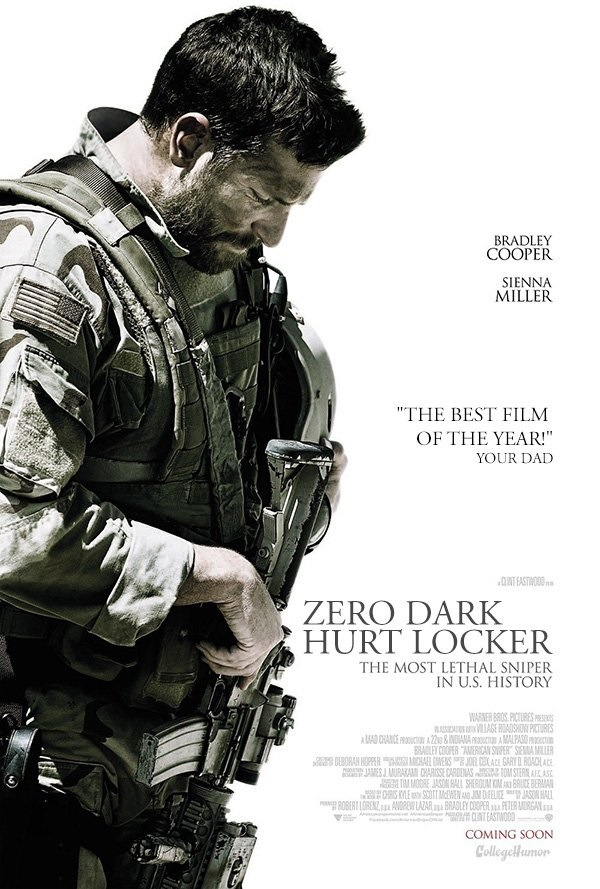
The Hurt Locker this ain’t.
I’ve seen a lot of things in my Oscar binging, and not all of them good. The Reader didn’t know what it was about. The Blind Side was too caught up in its white saviour hype to have a decent plot. Extremely Loud and Incredibly Close was ham-fisted and manipulative, even for a movie about a kid healing 9/11 with his autism. The Kids Are Alright was incredibly forgettable. Zero Dark Thirty was aggressively dull.
American Sniper might be the first one I think is actually evil.
On the surface, it’s the “true-life” story of Chris Kyle, the most lethal sniper in US history, with 160 confirmed kills. In practice, it turns a real and complicated person into some sort of ad-hoc Captain America out to save his comrades and country from evil by fighting in Iraq.
As an action movie, it fails, as there’s only one action sequence that’s in any way engaging. As a compelling narrative, it fails, as it lacks a through-line and whole sequences pass with no point. As a biopic, it fails, because it gives zero insight into Kyle the man, focusing instead on Kyle the icon (and a troubling one, which I’ll get to). As a movie about real-life snipers it fails, because I’ve had zero military experience, have held a real sniper rifle exactly one time, and even I know that Kyle’s one-man legend status ignores the fact that real snipers rely heavily on a partner, called a spotter (you want #18 in that link). In the movie, the marines assigned to Kyle play games on their phones or stare into the middle distance, instead of doing all the things a spotter is supposed to do.
But all of that just makes it a bad movie. What makes it an evil movie is what it does with its setting.
After the ham-fisted origin story, in which Kyle joins the navy seals to protect his countrymen from terrorists after an embassy bombing, the film cuts to Kyle in Iraq, where he’s out to stop Al-Qaeda from further attacks on Americans by protecting marines from his sniper perch.
Okay. Okay. Here’s the problem. This is supposedly a biographical picture about a real person that takes place during real events. And instead of examining a long and costly war that was based on a lie and may have led to no real benefit, American Sniper instead tries to sell viewers on the fairy tale. Painting the Iraq war as a good-vs-evil battle between noble American marines and evil terrorists is irresponsible at best, and criminally negligent at worst.
Kyle repeatedly and consistently calls the Iraqis “savages,” and nobody minds or objects. The only reason given for why people are trying to kill American soldiers is that they’re “evil.” No mention of “Well, we did come to their country and start shooting up the place for, as it turns out, no reason.” Jebas, Inglourious Basterds put more work into humanizing the enemy soldiers. The one soldier who questions if they’re really accomplishing anything is swiftly killed, and Kyle (and the movie) blame his death on him having doubts. Even Kyle’s PTSD, heavily hinted at in all of the bland, repetitive scenes of him Stateside between tours, is given a noble, heroic polish, in that the only thing that haunts him is that he can’t keep protecting his fellow soldiers. Not, you know, that time he shot a kid in the heart.
It’s racist, it’s revisionist, and given how middle America is flocking to it, its oversimplification of the war in Iraq is outright dangerous. I could say more, but I have seven more films to get to and holy fuck I spent 700 words on this one already.
#7 The Imitation Game
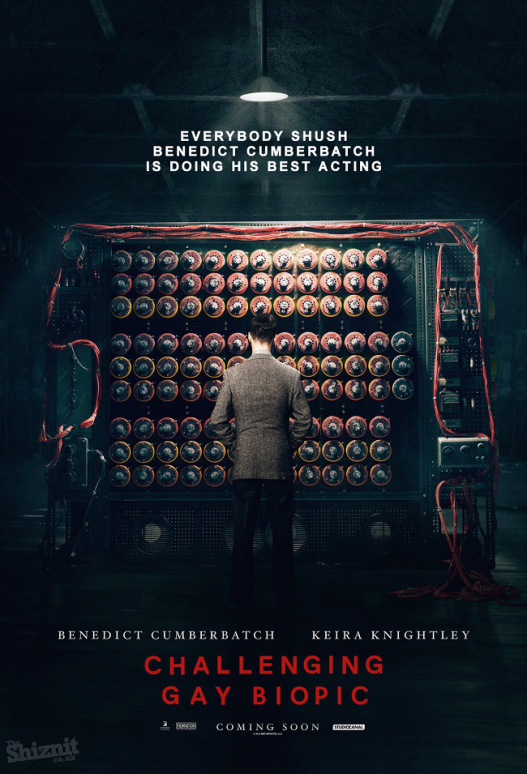
Fortunately, from here we jump from “bad” and “harmful” to simply “arguably revisionist” and “good but not great.”
Our second of four biopics (making up half the best picture nominees), The Imitation Game is the story of Alan Turing’s quest to build a thinking machine capable of breaking Germany’s Enigma code, and turn the tide of World War II. It’s anchored on excellent performances from Benedict Cumberbatch as Turing and Keira Knightley as Joan Clarke, one of his key colleagues who could only help with codebreaking in secret, as the military and her repressively conservative parents didn’t see it as proper work for a young lady.
It’s… it’s okay. It is. The cast is sound, the story isn’t without merit, but where it loses points is that it only briefly touches on the other important part of Turing’s story. He basically invents the modern computer in order to defeat the Nazis, sure, that’s all there, but in reward, his own government prosecuted him for being gay, and ultimately drove him to suicide. Battling the disdain of his colleagues, who would rather he focus on conventional codebreaking than his machine, that gets half the runtime, and may not even have been true. Being chemically castrated by his government, a process that comprised his mind and drove him to kill himself, that gets five minutes and a caption before the credits.
Joan Clarke’s story also has more punch to it: the way the military refuses to see her as anything but a secretary, and her parents demand she give up all of this independence nonsense and get herself married. But this, too, is pushed aside, so that we can focus on the struggle against Enigma. There are some important things happening in Turing’s story, but they’re mostly sidelined so that The Imitation Game can be a typical “He was different, but the things that made him different made him exceptional” story.
Which would be all well and good if they weren’t glossing over the part where one of the things that made him different essentially got him murdered by his own government. But we wouldn’t want the “normals” to feel too bad about themselves, would we.
#6 Boyhood
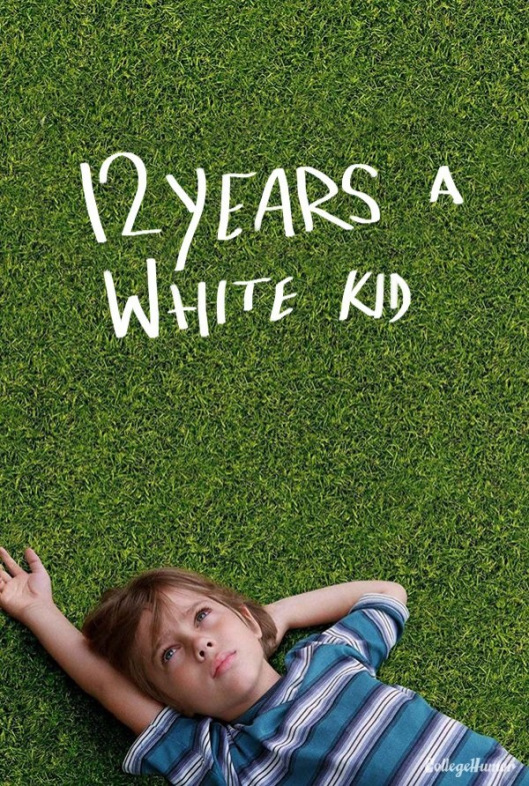
You’ve heard of Boyhood. I know you have. Richard Linklater’s ambitious project, filmed ten(ish) minutes at a time over the course of 12 years. We watch young Mason grow from age five to age 18, as he deals with peer pressure, divorced parents, and his mother’s string of boyfriends who turn into abusive alcoholics. It’s a neat gimmick, watching the characters age right in front of us, and the gimmick is well-done… but if the gimmick didn’t exist, this movie would be terrible.
I don’t hate it as much as John Elerick. I can’t mock it as thoroughly as Honest Trailers. What I can do is say that yes, the gimmick works, it keeps the movie fairly engaging, and it almost, but not quite, paves over the lack of anything resembling a story.
Seriously, there is no plot. No overall theme. Just a kid growing up, dealing with his mother’s horrible taste in men (or maybe it’s her, I mean, none of them are drunk assholes when she meets them, but in the end…), getting very briefly bullied by two kids never seen or heard from again but not really reacting to it at all, and turning into the worst kind of pretentious stoner philosopher. Seriously, by the time he graduates high school, he’s so full of weed-induced wank posing as insights that he may as well be a Mother Mother song.
Look, I’m not saying that there isn’t merit in a character study over a more sweeping narrative. But it’s still a work of fiction, it’s still story you’re telling, and thus the moments you share are a deliberate choice. Showing us that the day labourer Mason’s mother encouraged to go back to school got a degree and turned his life around because of her, but not telling us what happened to the step-siblings they were forced to leave with their drunken, abusive father because that’s how custody works… that is a choice. And, like so many of Linklater’s choices, it’s not a choice I agree with.
Or, hell, I don’t know, maybe those kids just weren’t available two years later.
Oh, and if you think I mentioned the abusive drunks Mason’s mom keeps hooking up too often, guess how annoyed you’re going to be two hours into this movie, when they reveal her latest boyfriend drinking… a beer!
#5 The Theory of Everything
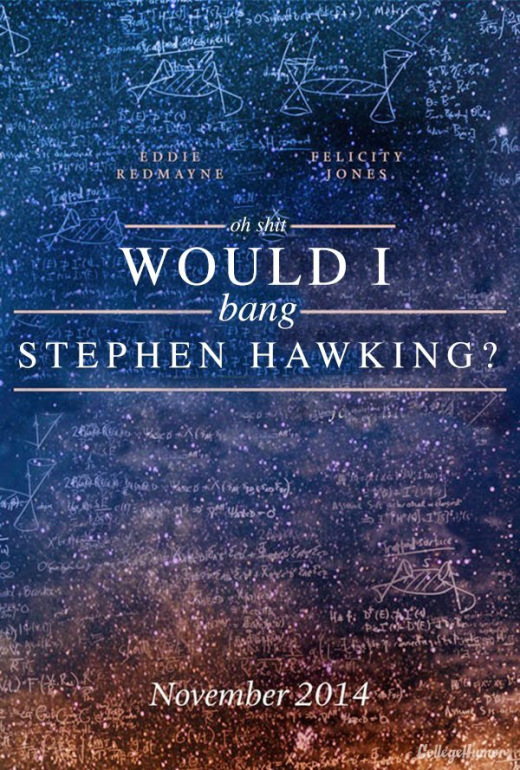
Moving on to our next touching biopic meant to secure a best actor nomination (and in this case, probably the Oscar itself).
The Theory of Everything is not about Stephen Hawking’s groundbreaking work in physics. I mean, that’s in there. It’s pretty hard to skip. But the movie’s true focus is his relationship with his first wife Jane, the mother of his three children.
Jane’s a devout Christian and Stephen’s a determined atheist, whose explorations of the nature and origins of the universe seem out to disprove the existence of God, or at least the necessity of a creator. That alone would be a hurdle for the star-crossed duo, but on top of that, Stephen develops ALS. Despite the fact that his body is about to start shutting down, Jane refuses to leave Stephen, and promises to love him for the rest of his life.
Of course… when she said that, the rest of his life was only supposed to be two years, not over fifty. But hey, she certainly gives it the old college try.
I could go on but at this point it’d just be a synopsis and that’s not the point. The point is, it’s a bittersweet love story featuring an incredible performance by Eddie Redmayne and a pretty good one from Felicity Jones. It’s, you know, pretty good.
#4 Whiplash
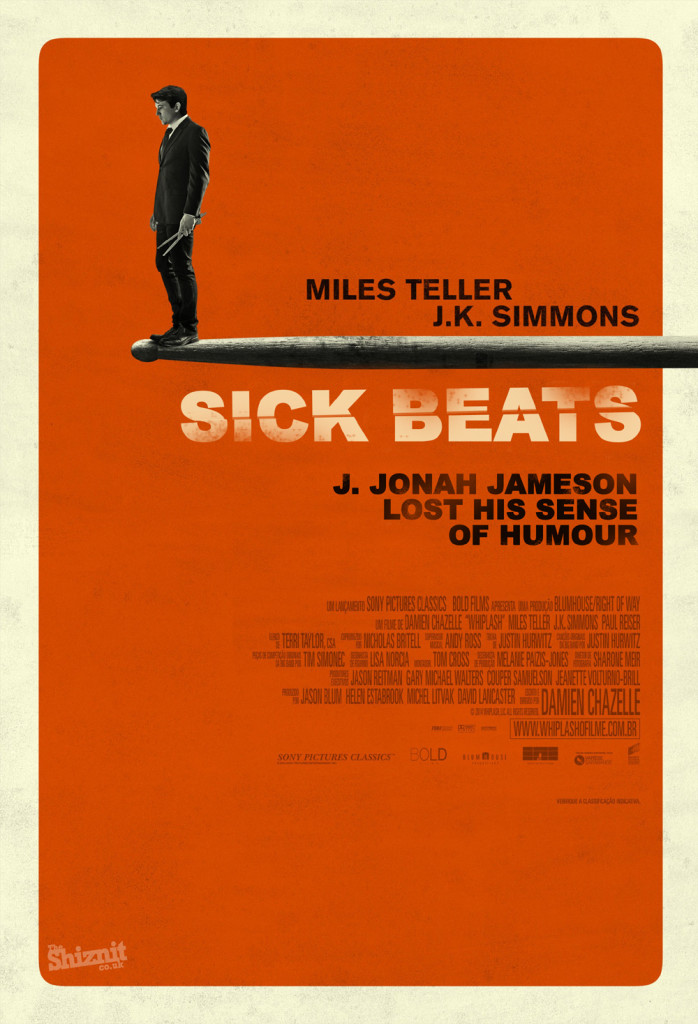
Whiplash is, first and foremost, and actor showcase. J. Jonah Jameson’s–sorry, J.K. Simmons’ powerhouse performance isn’t just a highlight, it’s half the point of the movie. The other half is to ask the question, what is the price for greatness? And is it worth it?
Andrew (Mr. Fantastic–sorry again, Miles Teller) is a drummer training at a prestigious New York music academy. One night (the first scene, this movie doesn’t waste a lot of time on intros) he catches the attention of Fletcher (Simmons), the professor who runs the school’s elite Studio Band. Being in the Studio Band is both a dream and a nightmare: a dream because winning competitions as part of the band is potentially a great start to a successful musical career, a nightmare because Fletcher is ruthless and cruel in his pursuit of musical perfection. As Weird Al recently learned.
Andrew is determined to be a great drummer. More than that, one of the great drummers. A musician known to legend, like the oft-referenced Charlie “Bird” Parker. Fletcher is out to create the next Bird, and believes that true greatness can only be forged in fire and adversity. So he throws as much abuse as possible at Andrew, and Andrew soaks it all up, sacrificing his family, his mental well-being, his budding relationship with the girl he’d been crushing on (Supergirl–no, Melissa Benoist, don’t know why I keep doing that, unless it’s a call-ahead reference to something later in the blog) in the name of becoming the next great jazz drummer.
Needless to say, there is a breaking point on the horizon.
It’s tense, it’s powerful, and nobody’s gonna say J.K. Simmons didn’t earn that Oscar next week.
#3 Selma
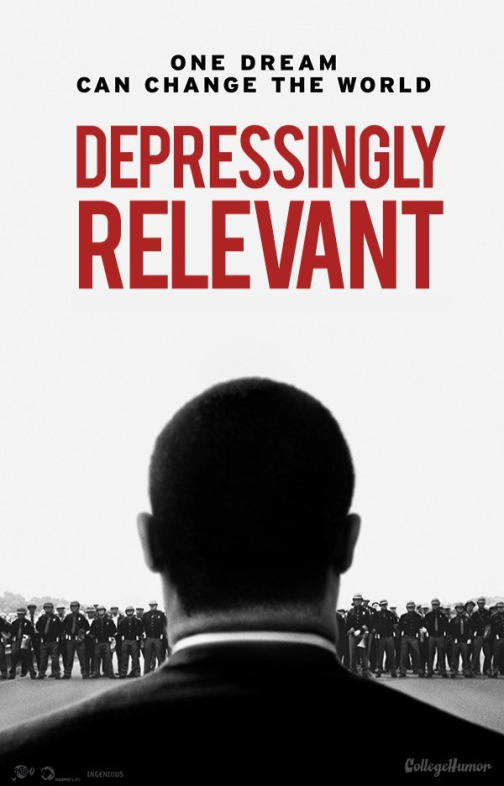
And we’re back to biopics, but this time, there’s some weight behind it.
Selma is the story of Martin Luther King Jr.’s campaign to secure equal voting rights in the south through a march through deeply racist and only recently desegregated Alabama, from Selma to Montgomery. A march opposed on all sides by citizens, police, and the Governor.
The movie took flack from white liberals who didn’t care for President Johnson being portrayed as reluctant to get involved in the voting rights issue, preferring to see him as a champion of the cause. I don’t know which side is right, here. I just don’t. But first of all, every single biopic nominated this year (or, really, ever, as far as I can tell) has been accused of some degree of revisionism, so why is Selma taking the heat instead of American goddamn Sniper; and second, this makes Selma a rarity: a civil rights movie that doesn’t hinge on a noble white person to inspire/lead/save the black characters.
It’s about the racial divide in America that never went away after slavery. It’s about white cops feeling they have free reign to beat on and even kill unarmed black men and women. It’s about a white government doing everything in its power to suppress black voters. And since all of those things are still happening, I’d say that makes Selma pretty damned important.
Also it’s just, like, super well done. That’s key too. It’s not comfortable, but you can’t deny the skill involved.
#2 The Grand Budapest Hotel

People who follow movies know what to expect from a Wes Anderson film. Quirky, sometimes to the point of twee, visually distinct, a hint surreal in places, and Owen Wilson will probably turn up at some point.
If you like Wes Anderson, you’re going to love the Grand Budapest Hotel. If you don’t like him, you’re going to hate it, because this is the most Wes Anderson-y Wes Anderson movie yet. But I found it witty, charming, consistently engaging, and visually dynamic. The story was fun, Ralph Fiennes was hilarious, the star-studded supporting cast was strong, it was fun all the way through.
Well, the framing device had a flaw, in that the set-up is that a girl has found a recording an older author made of the time he, as a younger author, interviewed the owner of the titular hotel about his time as its lobby boy, and that is… that is too many levels. Especially since the older author level doesn’t add anything. It could have just been Jude Law interviewing F. Murray Abraham about the film’s events, and that would have been fine. Tom Wilkinson as older Jude Law was just… there at the beginning for no clear reason.
#1 Birdman
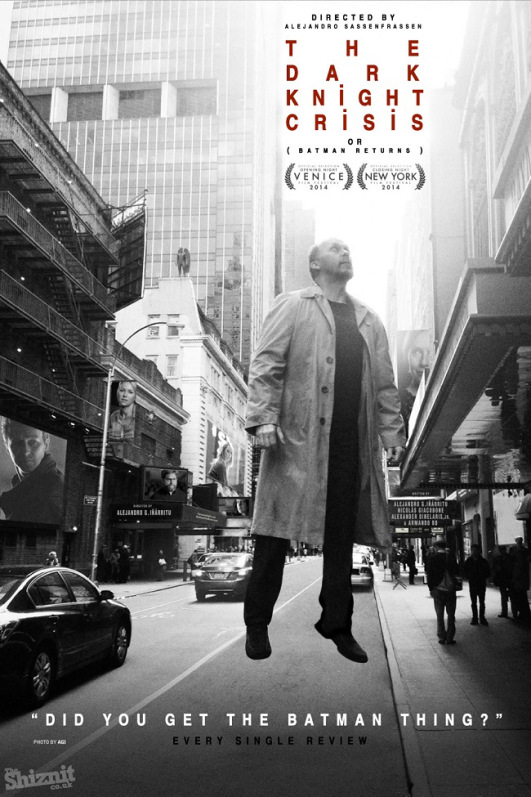
Birdman (or the Unexpected Virtue of Ignorance)* is best known as the movie about an actor who was famous 25 years ago for playing a superhero trying to reignite his career, played by Michael Keaton, an actor who was famous 25 years ago for playing a superhero. But once you get past that, there is a lot happening in this movie.
It’s about a conflict between the supposed grandeur of legitimate theatre versus the tawdriness of Hollywood Riggan (Keaton) represents (and, let’s face it, Broadway ain’t in a position to throw stones). It’s about a father trying to reconnect with the daughter he never had time for. It’s about clashing egos, as Riggan’s show depends on a performance by the talented but horrifically volatile Mike (Edward Norton, riveting as every theatre person’s worst nightmare). It’s about the dangers of delusions, as Riggan fights the dangerously tempting voice in his head trying to tell him he’s above this. It’s about how the great actors love to do prestige work, but sign on to blockbusters to pay the bills, as evidenced by every actor Riggan wants for the play being busy being X-Men or Avengers… hell, look at what I wrote about Whiplash, three out of four main characters have a superhero project on their resume. It’s about being told your best days are behind you, and the desperate need to do anything, anything, to prove that isn’t true. Which gets written off as “old white person problems,” but I think is more universal than that.
And all of that would be enough to make it my favourite, but it’s also got a neat gimmick beyond the Batman/Birdman thing: nearly the whole movie is shot as though it were a single take, despite months passing in the story. It works.
So that’s my rank order. Feel free to comment with yours, and we’ll see who wins on Sunday. (Go Birdman.)
*I do wonder if it was called “The Unexpected Virtue of Ignorance” until they signed Keaton. I mean, I have no compelling reason why that would be the case, but doesn’t it just sound true? Oh, crap, that sentence is the justification for every revisionist biopic ever, isn’t it…
